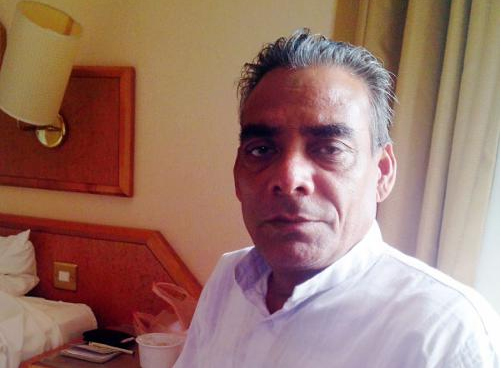|
Happy to see Urdu flourishing in Saudi Arabia
Muhammad Mujahid Syed
Saudi Gazette

JEDDAH — Ghazal’s charm has compelled Dr. Afaq Fakhri to devote his life to it.
Among the 13 participants of the Annual 2014 Mushaira, Fakhri made his mark with his thoughtful poetry and his serious tone. His simplicity and factual expression attracts the attention of his audience.
Fakhri has poetic traditions in his family. His father Fakhir Jalalpuri is a famous poet whose personality and contribution to Urdu poetry is a topic of research in Banaras Hindu University.
Born in 1957 in Jalal Pur, Ambedkar Nagar UP, Fakhri is knows Arabic, Persian, Urdu, Hindi and English.
He spoke with Saudi Gazette about his poetic career, literary background and latest developments in Urdu language and poetry.
Dr. Fakhri, who was a student of the famous Shibli College, Azamgarh, has many literary works to his credit and even holds a doctrate in Urdu literature.
His research work “Fikre Iqbal Ke Sarchashme” was published in 1993. His collection of essays “Naqd o Nava” got published in 2009 and another collection of critical essays “Infiradiayat Ki Talash” was published in 2013.
In the meantime his collection of Ghazals “Sukhan Aasaar” appeared in 2011. Fakhri has been teaching Urdu in Ashrafiyah College, Mahul, Azamgarh for 26 years.
He had participated in Mushairas and literary seminars in UK, Dubai and the Gulf countries.
“I am not disappointed with the future of Urdu language in India and in other countries. Without much government support Urdu is developing almost everywhere. A language is like a river. As a river passes from different terrains same is the case of language. Sometimes it looks like an ocean and some other time it seems to be a small rivulet. Time to time Urdu too had gone through this process but Urdu language has great potential to survive. It has seen grand royal courts, battlefields and the spiritual atmosphere of fakirs and mendicants. It has served people well and I hope it will continue doing the same,” Dr. Fakhri said.
He added: “If we make a comparative study of Indian and Pakistani Urdu poetry, India seems to be progressing. In many respects our poetry is better. In Pakistan, Urdu is a national language and everybody is learning Urdu, so if there seems any development in this field, it has government support and share too. Pakistani Ghazal is impressive but our poets too are writing so many great things. In India, we, the Urdu poets and writers most of the time do volunteer work. Without much government support a lot of literary work is going on in every nook and corner of India. Our work in the field of research work, criticism, novel and short stories is great. We serve Urdu according to our circumstances and means. It’s a miracle. If Indian government supports Urdu language, there would be national integration and development.”
Children should be taught Urdu at any cost not only in India but everywhere. “This Annual Mushaira 2014 has opened my eyes. If Mushaira audience in Jeddah can keep Urdu alive in their homes why can’t we do it India. This is the moral lesson of this Mushaira for me,” said Fakhri. Fakhri, who likes composing Ghazals, is fond of Meer, Ghalib and Momin, and drives inspiration from Makhmoor Saeedi, Shahryar, Iftekahr Arif, and Irfan Siddiqui. In the 20th century, Fakhri is impressed with the works of Asghar, Fani and Jigar.
The Indian poet lauded the Indian Consul General BS Mubarak and Press Consul, Information and Culture Dr.Irshad Ahmad for organizing the Mushaira in Jeddah.
“The quality and standard of the audience of Annual 2014 Jeddah Mushaira has impressed me. I am very happy to see that Urdu is flourishing in Saudi Arabia and this language is proving itself as a bridge between different nations and cultures,” he said.
Couplets from Dr. Afaq Fakhri’s poetry:
Mujhe laga labe izhar kholte bhi hain
Kabhi kabhi daro diwar bolte bhi hain
Dil se rooh tak jiske silsile bhi hote hain
Zindagi men kuchh aise hadese bhi hote hain.
Aaj kal ka me’yare adl kya kaha jaye
Mujrimon ke manchahe faisle bhi hote hain
|